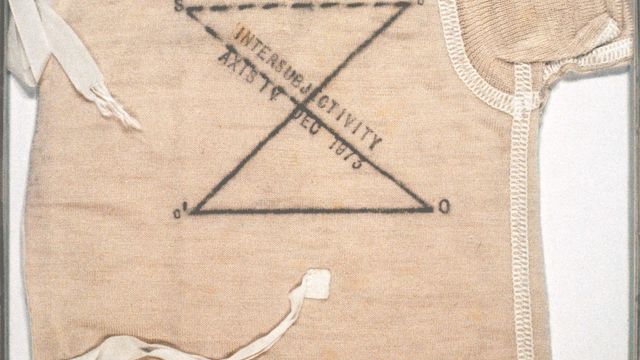
Mary Kelly
Since the early 1970s Mary Kelly has consistently questioned and redressed the theoretical, discursive, and aesthetic foundations of art and its subjects. Through her writing and large-scale installations—often produced as series that span a period of years—she has examined the crucial roles that social and ideological institutions (language, family, schools, the law) play in shaping—and manufacturing—subjectivity. In her early works, Kelly fleshed out the idea of a "constructed subject" (decentered, partial, and always already situated) as a necessary rejoinder to essentialist representations of woman as "whole," "autonomous," and "ideal." For her, shifting the boundaries of feminist art practice also meant shifting the notions of what counted as "conceptual art." With keen formal inventiveness, she ushered concepts of subjectivity, representation, desire, and sexual difference into an allegedly detached and impersonal sphere, introducing new frameworks for how these subjects might be addressed. Ultimately, in both the feminist and the conceptual fields, Kelly made manifest extant borders and limitations—and drew attention to what existed beyond them.
In one of her earliest and best-known works, Post-Partum Document (1973–79), Kelly explored the psychic and signifying processes of maternity. The work did not depict woman and child in any overtly iconic or mawkish way but rather charted a system of signs—a complex psychic, material, indexical portrait of this mother-child relationship and, in particular, of Kelly's experience as a mother.# In Post-Partum Document: Introduction (1973), for instance, four wool vests are presented in acrylic boxes. Each of these infant vests bears on its front dotted lines and block printing noting a date and partial Lacanian diagram (charting the shifting axis of intersubjectivity between mother and child as her child grows up and away from her). Although the affective intensity of the worn infant clothing—fetish object, index, and memorial—seems to stand in contrast to the cold mediation of the diagram, they nonetheless refer back to each other. By grafting together theory and sentiment, Kelly points to the multiple and interrelated systems through which the concept of motherhood takes shape. Historically the work has been a touchstone for artists concerned with identity as a discursive site.
The appropriated texts are taken from the 1962 testimonies of three women—Blanche Posner, Ruth Meyers, and Dagmar Wilson—who appeared before the House Un-American Activities Committee in 1962 after participating in protests opposing nuclear testing as part of the organization Women Strike for Peace (WSP). The excerpts selected by Kelly underscore the pronounced incongruities between the deliberately decentered "unorganization" of WSP and the hierarchies of the Cold War–era legal system in which they were testifying.# Here, as in Post-Partum Document, evidence of singularity and subjectivity remains legible throughout the formal proceedings. Kelly has preserved crucial notations in the original transcripts that indicate the subjective responses of the spectators (e.g., "laughter," "applause") to statements by the witnesses. These descriptions, appearing like stage directions, along with some subtly sarcastic remarks, make evident the women's halfhearted participation in the hearings. The absurdity of their being called before this committee also comes through, as when Blanche Posner is asked whether she wore a colored daisy to a protest and she replies, "Sounds like a far cry from communism." But the women's imperatives, and Kelly's project, go well beyond sarcasm. In their testimonies, Posner, Meyers, and Wilson insist on a powerful convergence between the personal and the political, citing their desire as mothers to protect their children from harm as the motivating force behind their antinuclear activism. Bringing together nuclear weaponry, motherhood, the judicial system, and the women's movement, Kelly's Mimus series stages an inherent, indeed vital, interrelationship between them.
—Leora Morinis


